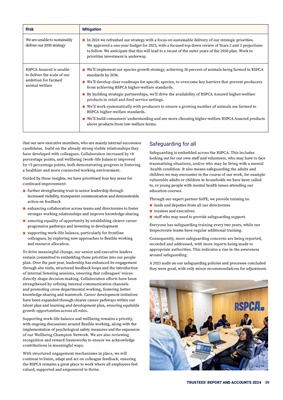
TRUSTEES' REPORT AND ACCOUNTS 2024 39
Risk Mitigation
We are unable to sustainably
deliver our 2030 strategy • In 2024 we refreshed our strategy with a focus on sustainable delivery of our strategic priorities.
We approved a one-year budget for 2025, with a focused top-down review of Years 2 and 3 projections
to follow. We anticipate that this will lead to a recast of the outer years of the 2030 plan. Work to
prioritise investment is underway.
RSPCA Assured is unable
to deliver the scale of our
ambition for farmed
animal welfare
• We'll implement our species growth strategy, achieving 36 percent of animals being farmed to RSPCA
standards by 2036.
• We'll develop clear roadmaps for specific species, to overcome key barriers that prevent producers
from achieving RSPCA higher-welfare standards.
• By building strategic partnerships, we'll drive the availability of RSPCA Assured higher-welfare
products in retail and food service settings.
• We'll work systematically with producers to ensure a growing number of animals are farmed to
RSPCA higher-welfare standards.
• We'll build consumers' understanding and see more choosing higher-welfare RSPCA Assured products
above products from low-welfare farms.
that our new executive members, who are mainly internal succession
candidates, build on the already strong visible relationships they
have developed with colleagues. Collaboration increased by +8
percentage points, and wellbeing (work-life balance) improved
by +5 percentage points, both demonstrating progress in fostering
a healthier and more connected working environment.
Guided by these insights, we have prioritised four key areas for
continued improvement:
• further strengthening trust in senior leadership through
increased visibility, transparent communication and demonstrable
action on feedback
• enhancing collaboration across teams and directorates to foster
stronger working relationships and improve knowledge-sharing
• ensuring equality of opportunity by establishing clearer career
progression pathways and investing in development
• supporting work-life balance, particularly for frontline
colleagues, by exploring new approaches to flexible working
and resource allocation.
To drive meaningful change, our senior and executive leaders
remain committed to embedding these priorities into our people
plan. Over the past year, leadership has enhanced its engagement
through site visits, structured feedback loops and the introduction
of internal listening sessions, ensuring that colleagues' voices
directly shape decision-making. Collaboration efforts have been
strengthened by refining internal communication channels
and promoting cross-departmental working, fostering better
knowledge-sharing and teamwork. Career development initiatives
have been expanded through clearer career pathways within our
talent plan and learning and development plan, ensuring equitable
growth opportunities across all roles.
Supporting work-life balance and wellbeing remains a priority,
with ongoing discussions around flexible working, along with the
implementation of psychological safety measures and the expansion
of our Wellbeing Champion Network. We are also reviewing
recognition and reward frameworks to ensure we acknowledge
contributions in meaningful ways.
With structured engagement mechanisms in place, we will
continue to listen, adapt and act on colleague feedback, ensuring
the RSPCA remains a great place to work where all employees feel
valued, supported and empowered to thrive.
Safeguarding for all
Safeguarding is embedded across the RSPCA. This includes
looking out for our own staff and volunteers, who may have to face
traumatising situations, and/or who may be living with a mental
health condition. It also means safeguarding the adults and
children we may encounter in the course of our work, for example
vulnerable adults or children in households we have been called
to, or young people with mental health issues attending our
education courses.
Through our expert partner SAFE, we provide training to:
• leads and deputies from all our directorates
• trustees and executives
• staff who may need to provide safeguarding support.
Everyone has safeguarding training every two years, while our
Inspectorate teams have regular additional training.
Consequently, more safeguarding concerns are being reported,
recorded and addressed, with more reports being made to
appropriate authorities. This indicates a rise in the awareness
around safeguarding.
A 2023 audit on our safeguarding policies and processes concluded
they were good, with only minor recommendations for adjustment.